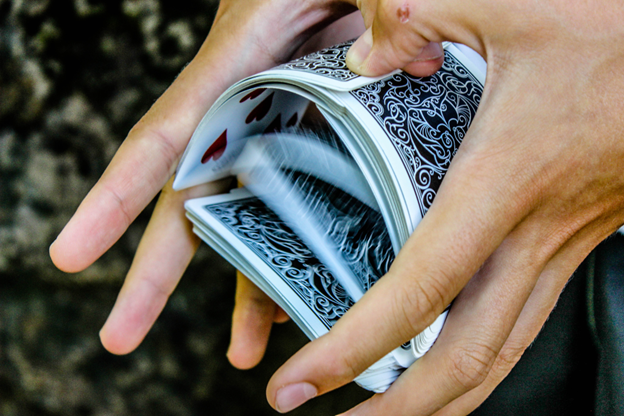Confidence is usually the hidden currency of any game played at the table, whether it is poker, a live blackjack lobby, or even a friendly round of dominoes. Skill and strategy are undeniably essential. However, when the stakes rise, confidence is what separates those who crumble under pressure from those who succeed.
What makes this trait interesting is that confidence is not always a rejection of one’s actual hand or position. Instead, it is about perception, psychology, and the ability to project control. So, let’s look at some powerful strategies that can help you remain confident, influence the table atmosphere, and maximize your chances of success.
Mastering Body Language & the Art of Presence
When players sit down at the table, their body language speaks before they even utter a single word. In games like poker, bluffing is as important as calculating odds. So, confidence usually comes from how a player projects themselves physically.
Human beings are naturally wired to pick up on non-verbal cues. Our posture, gestures, and micro-expressions influence how others perceive our confidence and credibility. If a player looks jittery, constantly fights, or avoids eye contact, opponents are more likely to sense weakness. On the other hand, calmness, controlled movements, and deliberate gestures communicate authority. Here are some ways players use it.
-
- The Power Pose: Confident players usually adopt open and grounded body postures. Sitting upright, keeping shoulders relaxed, and maintaining steady breathing signals composure. They maintain this stance even when unsure of their next move.
- Eye Contact Control: Too much staring can be intimidating. However, strategic eye contact at key moments establishes dominance. A lot of skilled players use this trick to keep opponents second-guessing whether they are strong or bluffing.
- Controlled Silence: Silence is one of the most underrated psychological tools. By not rushing into responses and maintaining a calm aura, you can unsettle opponents, who interpret the quiet as unshakable confidence.
By mastering your body language, you trick yourself and others into believing in your control. Adopting confident postures doesn’t just affect perception. It boosts testosterone and lowers cortisol, hormones associated with dominance and stress. So, even if you feel anxious, acting the part can genuinely divert your internal state toward confidence.
The Mental Reset
Every player knows the crushing feeling of a miscalculated move or a bad heat. What differentiates confident players from shaky ones is how they process setbacks. Rather than spiralling in self-doubt, you can adopt a mental reset trick. This entails reframing mistakes as opportunities.
Cognitive psychology explains that the way we interpret experiences has a significant effect on our behaviour. This concept, known as cognitive reframing, can help you shift your perception of losses. Rather than seeing failure as proof of inadequacy, confident players view it as information. That is, data that sharpens their game. Below are some ways through which players use this.
- The Next Hand Mentality: Top players remind themselves that each round is a fresh slate. Carrying frustration from a previous hand only clouds judgment for the next one. So, by mentally saying, “That hand is over, the next one is what matters,” they maintain focus and prevent tilt.
- Highlighting the Process, Not Just the Result: Instead of obsessing over whether you win or lose a hand, confident players concentrate on whether they’ve made the right decision with the information they had at the time. This minimizes regret and strengthens trust in your skills.
- Mini Rituals for Resetting: Some players take a stop of water, shuffle their chips rhythmically, or briefly look away from the table after a mistake. These small rituals signal to the brain that the moment has passed and prevent spirals of negativity.
By reframing mistakes, players protect their self-belief. Rather than thinking, “I’m terrible at this game,” they think, “That was a bad beat, but I made the right call.” This mindset prevents self-sabotage, sustains motivation, and preserves the mental energy required to stay sharp across long sessions.
Anchoring with Mental Visualization & Positive Self-Talk
When the tension rises and every decision carries weight, internal dialogue becomes a player’s best ally, or worst enemy. Confident players understand the power of the mind and deliberately use psychological anchoring techniques to keep themselves in a winning mindset. The concept of mental anchoring comes from sports psychology and Neuro-Linguistic Programming (NLP).
By associating certain thoughts, words, or visualizations with feelings of confidence, you can trigger these states at will. It is the same reason elite athletes pump themselves up before crucial moments, since psychology directly influences performance. How do players use it?
- Mental Visualization: Before sitting at the table, many players visualize themselves staying calm under pressure, reading opponents accurately, and making winning plays. This primes the brain for confidence, since the mind usually struggles to differentiate between vividly imagined success and real success.
- Cue Words and Phrases: Some players quietly repeat phrases like “I’ve got this” or “Stay Sharp” when faced with touch decisions. These affirmations strengthen confidence and block intrusive negative thoughts.
- Anchoring with Gesture: A player might subtly tap their ring, press their fingertips together, or squeeze a chop as a physical anchor associated with calmness or assertiveness. With enough repetition, the gesture itself becomes a switch that triggers confidence.
Anchoring creates a psychological shield against stress. Even when odds are against them, players can summon calmness and self-belief immediately. This helps their decision-making and makes them appear unreadable to opponents who can’t sense any cracks in their mental armour.
Maintain an Unshakeable Belief in Yourself!
At the table, confidence is not about always holding the strongest hand. It is about holding the strongest mindset. The strategies above prove that confidence is not a mysterious gift but a cultivated skill. At the end of the day, the most powerful card a player can hold isn’t in their hand. Rather, it is the unshakeable belief in themselves.



